Is fake rapport a bad thing? Should you pretend to be interested in something to help get something you want?
It’s an interesting question I’ve been considering.
I bought my first pair of cowboy boots ever this week, and it turns out the salesperson who helped me pulled a fast one on me. They sold me boots well above the list price on their website, and upon closer inspection at home, they’re not in the new condition they should be in fresh from the store.
Needless to say, I will be returning them.
But it also has me thinking about the things the salesperson said. Like when he heard I played soccer, he talked with me a bit about it and said he played. Yet, when I asked him his position, his height and build didn’t really fit.
Given how the rest of this sale went, I now doubt he actually plays soccer. I think he asked to build fake rapport with me as we was angling for the boot sale commission.
The lesson for leaders is to be careful and transparent when building rapport with your team.
You can be interested and be an eager listener to what your team is passionate about, but never cross the line to pretending you care about something you don’t. I can attentively listen to my team members tell me eagerly about their favorite sports team, their kids, or a hobby, but I never fake that I’m also into it if I’m not.
The reason for this should be obvious: If you fake it, and they find out, your relationship is burned. They will no longer like nor trust you.
Don’t do that.
—
Let’s dive into this week’s leadership topics…
Table of contents:
- 🥘 Food for Thought on How McDonald’s can Help You
- 📰 News & Reports for Managers on a Decline in Well Being?
- 🛍️ Now is Your Chance to Get Your Cyber Monday Leadership Deal
- 📖 Your Leadership Long Read on Reframes to Make You a Better Leader
- ❓ Poll of the Week on Remote Work Challenges
➡️ Did a friend forward this to you? Get every issue straight to your inbox by signing up here.
Note: This is a preview of our weekly leadership newsletter, Lighthouse Leadership Weekly (LLW).
To get this sent to your inbox every week, along with our latest long form essays on this blog, you can sign up here.

🥘 Food for Thought
“I use a trick with co-workers when we’re trying to decide where to eat for lunch and no one has any ideas. I recommend McDonald’s.
An interesting thing happens. Everyone unanimously agrees that we can’t possibly go to McDonald’s, and better lunch suggestions emerge. Magic!” - Jon Bell in this Medium post
Can McDonald’s help you make better decisions at work?
Actually, it can.
I was reminded of this working with my team on a project this week. I made a suggestion that turned out to be pretty off upon further review.
Yet, something magical happened when I did.
Everyone was happy to tell me why it was wrong, and within 24 hours we had a fantastic solution we had otherwise been struggling to pull together over the prior week.
It reminded me of this McDonald’s story I read many years ago, and I knew I wanted to share it with you here.

Bad ideas lead to good ones.
Getting started is often the hardest thing. A close second is knowing exactly what you want.
Fortunately, bad ideas solve both of those problems.
When you are staring at a blank screen, writing anything, even a horrible first draft can be all you need to get going.
Meanwhile, when you’re struggling to come up with an idea or gain clarity on what you want, bad ideas can help, too. As Bell wrote later in his post:
“It’s as if we’ve broken the ice with the worst possible idea, and now that the discussion has started, people suddenly get very creative.
I call it the McDonald’s Theory: people are inspired to come up with good ideas to ward off bad ones.”
The power of bad ideas is that it can help give shape to what a good idea should be.
Take McDonald’s literally. You’re trying to decide where to go for lunch as a team. Any of these could be reasons people dislike the idea of going to the golden arches:
- It’s too far away (so find something closer)
- Your team hates fast food (so find something healthier)
- The tables are too small so you can’t sit together (so find a place with seating for your whole team)
- A team member is a vegetarian and there’s nothing good at McDonald’s for them (so find a vegetarian-friendly place)
You get the idea.
Yet, if you look at the list of reasons why, you can see that following each of them would lead to eating at a different place. It also would potentially lead to a different way of solving the problem (a map for a closer place, different Yelp searches for some of the others, etc).
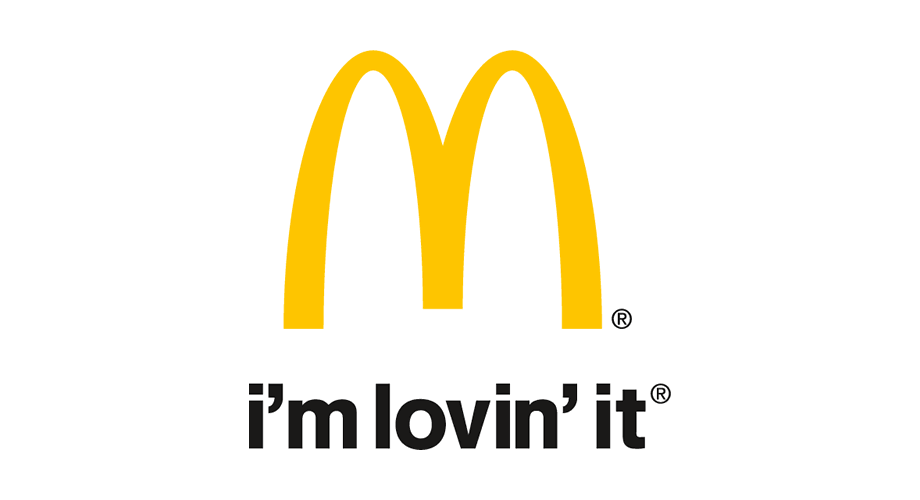
Managers are the best people to practice the McDonald’s Theory.
While anyone could suggest McDonald’s-like ideas when a group is having a hard time deciding (or starting), as a leader, you are in the best position to be the one to say it.
Here’s why:
- Reinforce psychological safety: Sometimes your team will be afraid to make suggestions because they don’t want to look dumb. When you make a weak, or even borderline absurd suggestion, it makes everyone else’s ideas look better and safer to share.
- See who to call on: If you’re standing in front of your team, watch for strong reactions to your suggestion. By asking those people why they reacted so strongly why, you can get things rolling in the right direction. Just remember to ask them with curiosity, not accusation, so they don’t get defensive.
- Ask follow-up questions: Suggesting something you know is poor or wrong doesn’t always lead to an immediate, perfect answer. Yet, you can get to the right answer by leading the conversation and asking questions of your team to understand what, how, and why your suggestion is bad.
So next time your team is stuck on a project, think of a bad idea or solution. Suggest that and see how it gets your team talking.
📰 News & Reports for Managers
Rate of thriving employees hits new low.
We all know Gallup for their famous “Employee Engagement” statistic they’ve been tracking for decades, but there are many other numbers they track as well.
And one of them is whether people feel like they’re “thriving” or “struggling”:
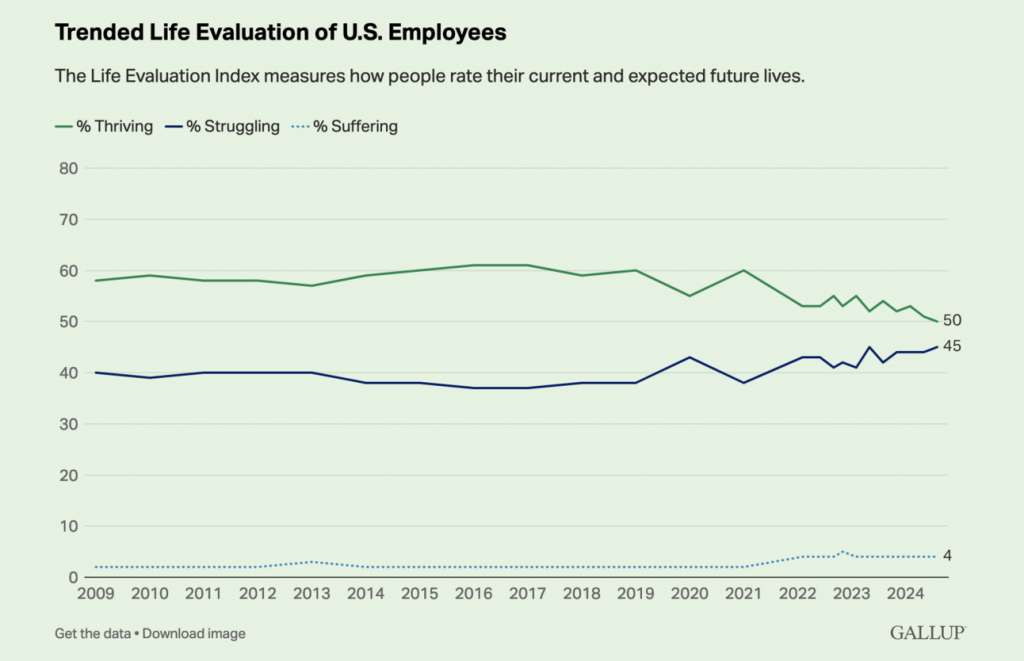
As you can see, things were pretty steady from 2009 - 2019, but then things started changing during the pandemic and beyond.
And unfortunately, that trend has been in the wrong direction.
You can see a steady climb in those struggling, largely at the expense of those thriving. And making matters even worse, those outright “suffering” is near all time highs, too.
Why should you care?
A lot of leaders get into management because they care about people. You enjoy inspiring and motivating others, and helping people reach their full potential.
But some of you also get thrust into leadership for any number of reasons that may not give you the full picture on how important caring really is.
Speaking directly to those of you in the latter camp, you really do need to care about how your team is doing overall…not just their performance within the confines of your office.
No, you can’t help them with their divorce, miscarriage, sick parent or loved one, or other life challenges, but you can have empathy and a little understanding for them.
And you can keep an eye out for ways you can potentially help them, which might just shift someone from struggling to thriving. Things I’ve seen leaders do that made a big difference for someone who would count as struggling:
- Let them shift their work hours to more easily take a family member to cancer treatments, manage an at-home care schedule, or similar medical situation.
- Giving an A+ performer a slightly lighter workload for a month to let them deal with a nasty divorce in its final phases.
- Simply lending an ear during 1 on 1s for a team member struggling, and then referring them to outside help to do more than you can for them.
- Helping someone chart a path to a role that pays significantly better so that they can get out of their financial hardship. (For example this)
- Check in on company policies to help with difficult situations like Family Medical Leave, Health Insurance coverage, what can/can’t be reimbursed, etc.
- Keeping an eye out for generous layoff packages, and presenting that as an option if someone knows they will need to leave soon anyways.
These sort of accommodations are always hard to offer; they require some sacrifice by you and your team and should be made with great consideration and care. It’s a balancing act to avoid seeming to pay favorite, not be taken advantage of, and minimize conflicts with other people’s needs.
Yet, it’s worth it, as Gallup’s data shows:
“When employees are thriving in life overall, they miss 53% fewer days of work due to health issues and are 32% less likely to be watching for or actively seeking new jobs.”
So if you help your team members get out of a struggling situation, recognize this is what you’re unlocking; showing up much more consistently at work, and retaining them for the long haul.
Isn’t that worth investing in, especially for your best people?
I can tell you from experience that those 6 bullets above all had great outcomes where the employees who were supported by their manager stayed loyal for years to come. And those that stuck around returned to top form in time as the personal crisis that had them struggling passed.
The next time you see an employee may be struggling, challenge yourself to show some compassion. Try to understand why they’re struggling and then consider if, and how you may be able to help them. You may be surprised by the rebound benefit you get, and how good you’ll feel helping another human.
🛍️ Now is Your Chance to Get Your Black Friday Leadership Deal
Are you investing in yourself? Have you grown as a leader in 2024?
If the answer is no, or you want to do more, then this is your sign.
We have a great Cyber Monday deal on some of our most popular Lighthouse Lessons courses going on now.
Whether you want to become a better coach 🧢, learn how to be more of a servant leader 💗, or master hybrid & remote management skills 💻, we have bite size, super-actionable courses to help you.
All you need is 15 minutes a week to become a better leader.
That’s right. What makes our programs work so well is that we break down the most important concepts on a topic into bite-size pieces so you can learn even with the busiest of schedules.
Each week you get one lesson you can review in 15 minutes. In every lesson, we tell you exactly how to apply it to your team that week:

With this approach, you learn quickly, and then reinforce it by putting it immediately into practice with your team.
And best of all? You buy the course of your choosing now, and start in the new year, so no conflicts with your busy holidays and end of year workload.
So if you want to build new skills in the most light-weight and effective way possible, all while supporting Lighthouse to help us continue this newsletter, our blog, and other efforts, this is your chance.
📖 Your Leadership Long Read on Reframing Your Brain
You’ll see throughout our many blog posts, and sometimes in this newsletter, we’ll use a Dilbert comic to help make a point. They’re often the perfect mix of funny and surprisingly on the nose for situations we’ve all experienced.
That’s also why I keep an eye out for other things Scott Adams (Dilbert’s creator) does; when he stays in his lanes of expertise around persuasion/hypnosis and workplace observation, I find I can learn some interesting things from him.
And recently, I saw he had a new book called, Reframe Your Brain, which is all about persuading yourself to make it easier to change in the ways that you want to most.
For example, he writes about how if you’re having trouble stopping drinking, reframing in your mind that, “alcohol is poison” is a great way to reinforce that and simplify ideas like “I hate hangovers”, “I never sleep as well after drinking”, and “it interacts poorly with my meds”.
And interestingly enough, I actually have a friend who specifically uses that phrase to explain why he quit drinking (I don’t know if he got it from Adams; I haven’t had a chance to ask them).
Anyways, while a lot of the book is more focused on personal goals and development, a few of the reframes are perfect for leaders to apply.
So whether you just like shortcuts, or would prefer not to buy a book from him, we’ve taken 5 of the best reframes for leaders and put them in a post on the Lighthouse blog this week.
If you’re clever, you can probably reverse engineer how they work and then make your own, or simply enjoy these 5 and try them out for yourself.
Read: 5 Powerful Ways to Reframe Your Thinking as a Leader
❓ Poll of the Week
I actually ran two polls on my LinkedIn account last week, and both had interesting results, so I thought I’d share both:
First, I was curious how leaders were feeling right now:
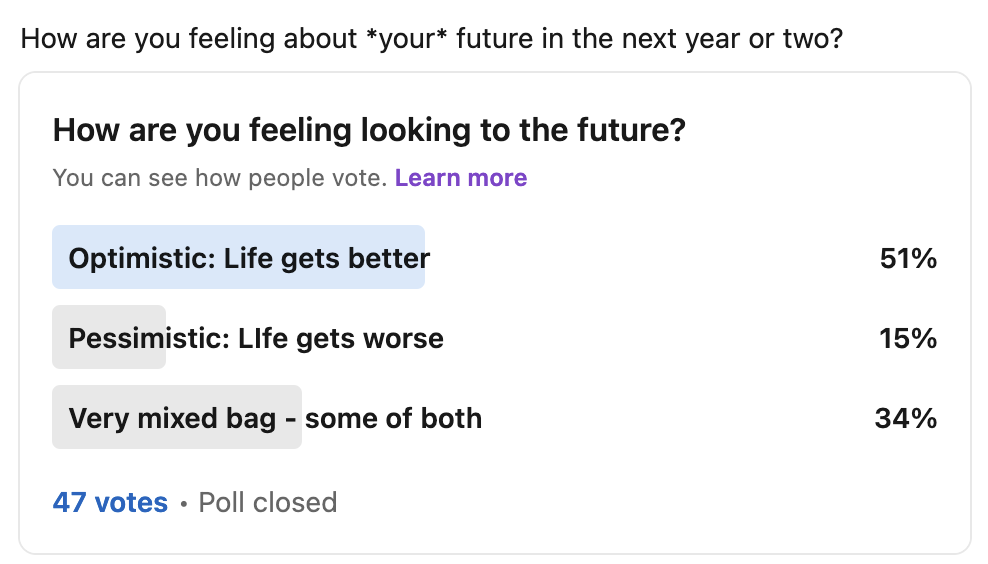
It was great to see that more than half of the respondents were optimistic, and of those that weren’t, most were mixed, not outright pessimistic, by a rate of over 2 to 1.
Then, I also asked you about using AI, which most of you are automating tasks, versus getting feedback. It was also interesting to see that none of you who responded are using it as a coaching tool:
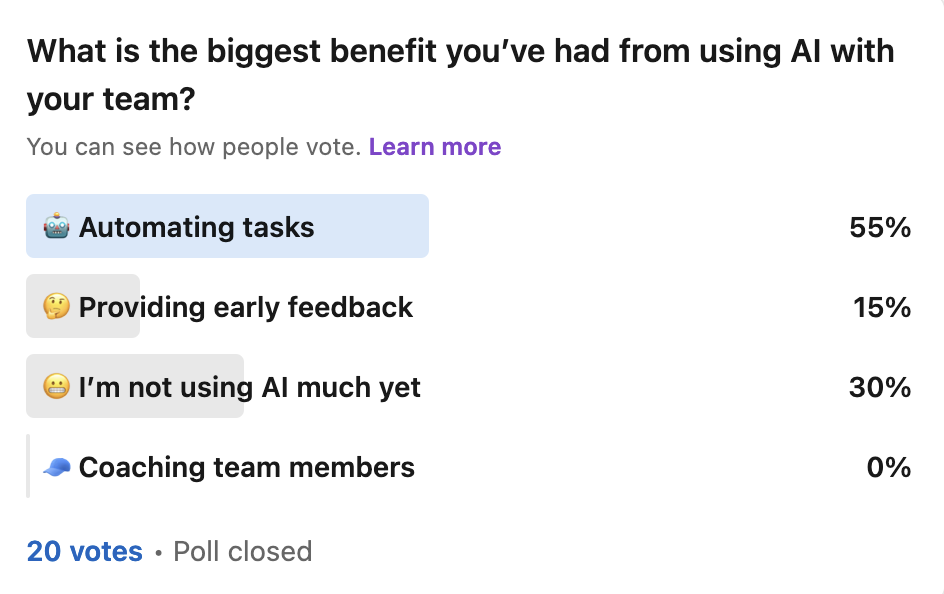
I can also see that this had our lowest response rate of any poll in quite some time, so I think it’s time to move away from some AI discussions. It seems you’re growing tired of it (reply and let me know if I’m wrong!).
—
Now, this week, we look at a common question that is still top of mind for many leaders even years after the pandemic shifted so many of us to at least partially remote work:
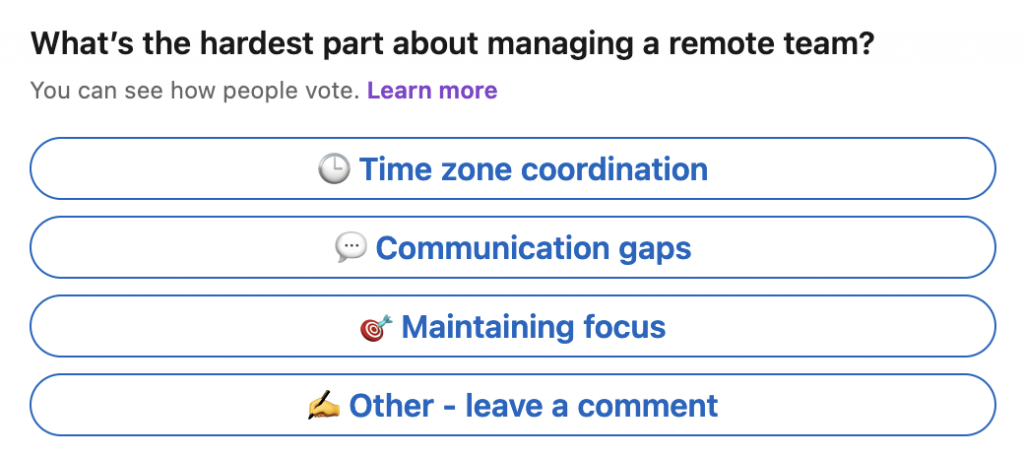
So tell us what your biggest remote challenge is by taking our poll here.
This will also then help us know what kind of remote challenges to write more about here and on the blog.
Sign up to get this newsletter & our latest blog posts straight to your inbox




